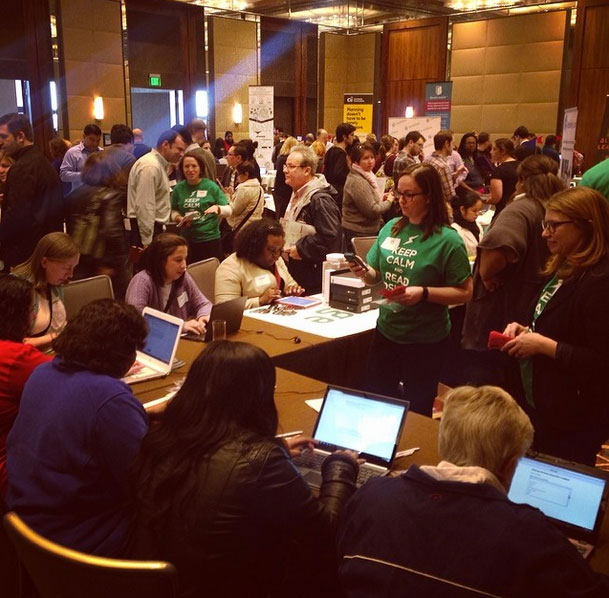There’s a lot of factors that make Baltimore an emerging edtech hub, like proximity to D.C. and the fact that entrepreneurs here don’t shy away from big problems.
But one big reason edtech gets attention is the collection of companies and resources that form the ecosystem. It goes back further than you might think.
Here’s a look at the moves that made the community what it is now:
1. Sylvan Learning Systems
Big companies that provide influence and potential investment help to create a viable path for startups. For Baltimore’s edtech community, Sylvan Learning Systems is frequently near the top of the list. The company that provides tutoring content and centers started the innovation trajectory in 1990. That’s when entrepreneurs Douglas L. Becker and R. Christopher Hoehn-Saric bought a 50 percent stake in the company from KinderCare. They completed the takeover in 1993, and named it Sylvan Learning Systems. The new owners proceeded to spin out additional companies.
2. Educate, Inc.
In the aughts, Sylvan decided to split its K-12 and college businesses. In 2003, Sylvan Learning sold its K-12 businesses in a management-led buyout to form Educate, Inc. Hoehn-Saric assumed leadership of the new company, and private equity firm Apollo Management LP provided funding. In 2005, Educate, Inc. was once again involved in a buyout deal to the tune of $535 million. In this case, Hoehn-Saric led a group of investors that also included Citigroup Private Equity and Sterling Capital Partners. Educate, Inc. still exists as the parent company of Sylvan Learning.
3. Laureate Education

Sylvan’s college-focused business, which primarily focused on running for-profit universities both online and outside the U.S., became Laureate Education in 2004. Becker helmed the new company, and took it public. At the time, Becker told the Washington Post the college growth was outpacing K-12. In 2007, Laureate Education went private in a $3.8 billion deal. The company continues to operate out of offices in Harbor East, and it could be involved in another deal soon. In the fall of 2015, Laureate became a public benefit corporation and filed for an IPO to go public once again. The lineage can now be traced to Straighterline, which is growing its business of online college courses.
4. Connections Education
Baltimore has connections to another big player in the education content game through Connections Education. The K-12 virtual learning company was acquired by Pearson from another investor group led by Apollo Management LP. The deal was reportedly worth $400 million. Connections Education maintains its headquarters in Harbor East.
5. Moodlerooms
Open source in edtech was the source of another big deal. Moodlerooms was acquired by Blackboard in 2012 as part of a wider push into open source by the D.C.-based higher education dashboard provider. Moodlerooms, which has software based on and is a partner with the open learning management system Moodle, continued as an independent division of Blackboard. Today, Betamore-based eThink Education is building a fast-growing business around a Moodle partnership.
6. Towson University’s entrepreneurship play

The area’s many universities are often talked about as a key factor in Baltimore’s edtech prowess, and one deal is an example of how they can form a central point for the ecosystem. Longtime edtech investor Frank Bonsal III took the helm at Towson University’s TowsonGlobal incubator in 2013. By the end of the year, he was the university’s first director of entrepreneurship. The combination of Bonsal’s expertise and the university’s history of teacher training coalesced to make TU a major force. Though the incubator (now called TU Incubator) helps all kinds of startups, edtech companies account for just about half of its membership.
7. Calvert Education Services
This deal showed innovation can happen at the school level, too. Roland Park private school the Calvert School spun out its distance-learning program as a business, and it was acquired by Camden Partners in 2013. Later that year, the company merged with the VSCHOOLZ platform, EdSurge reported. The deals were a sign of Camden Partners founder David Warnock’s interest in education innovation, which continues with his work in founding the Green Street Academy in Northwest Baltimore and proposals for education reform in the recent mayor’s race.
8. NYC startups relocate

These South Baltimore startups weren’t acquired by a bigger company, but their entrance into the Baltimore edtech community was a win in its own right. Citelighter moved from New York in early 2014, followed closely by Three Ring. Both companies received investment from the Propel Baltimore Fund, which was created in part to lure startups to relocate. Investors like NEA founder Frank Bonsal Jr., John Cammack and Vince Talbert (who invested in Three Ring only) also helped with money and support. The splashy moves from the big city showed that Baltimore’s place in the edtech world wasn’t only talked up by locals. When they got here, both companies took to the town, joining Betamore and becoming tech community leaders.
9. Curiosityville
When it comes to edtech, don’t sleep on the youngest learners. Houghton Mifflin Harcourt acquired this Cockeysville edtech startup that provides a platform for students aged 3-8. The game-based platform is rooted in neuro-education, which links brain research and education.
10. Words and Numbers
The next wave in edtech could be marketplaces, where teachers can access a mix of free and paid content, and potentially sell their own. A Baltimore deal factored into one company’s move toward this model. D.C.-based Wisewire acquired Woodberry-based Words and Numbers in early 2016, and made the startup’s content part of its education marketplace.
—
What did we miss? Let us know in the comments.







